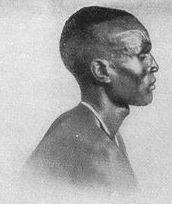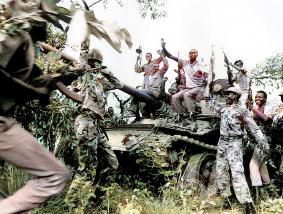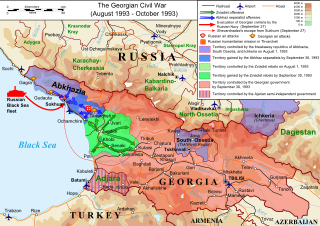
Sudan's human rights record has been widely condemned. Some human rights organizations have documented a variety of abuses and atrocities carried out by the Sudanese government over the past several years under the rule of Omar al-Bashir. The 2009 Human Rights Report by the United States Department of State noted serious concerns over human rights violations by the government and militia groups. Capital punishment, including crucifixion, is used for many crimes. In September, 2019, the government of Sudan signed an agreement with the UN High Commissioner for Human Rights to open a UN Human Rights Office in Khartoum and field offices in Darfur, Blue Nile, Southern Kordofan and East Sudan. In July 2020, during the 2019–2021 Sudanese transition to democracy, Justice Minister Nasredeen Abdulbari stated that "all the laws violating the human rights in Sudan" were to be scrapped, and for this reason, Parliament passed a series of laws in early July 2020.

An internally displaced person (IDP) is someone who is forced to leave their home but who remains within their country's borders. They are often referred to as refugees, although they do not fall within the legal definitions of a refugee.

Northern Bahr el Ghazal(Arabic: ولاية شمال بحر الغزال) is a state in South Sudan. It has an area of 30,543 km2 and is part of the Bahr el Ghazal region. It borders East Darfur in Sudan to the north, Western Bahr el Ghazal to the west and south, and Warrap and the disputed region of Abyei to the east. Aweil is the capital of the state.

The Dinka people are a Nilotic ethnic group native to South Sudan. The Dinka mostly live along the Nile, from Mangalla-Bor to Renk, in the region of Bahr el Ghazal, Upper Nile, and the Abyei Area of the Ngok Dinka in South Sudan.

The Second Sudanese Civil War was a conflict from 1983 to 2005 between the central Sudanese government and the Sudan People's Liberation Army. It was largely a continuation of the First Sudanese Civil War of 1955 to 1972. Although it originated in southern Sudan, the civil war spread to the Nuba mountains and the Blue Nile. It lasted for almost 22 years and is one of the longest civil wars on record. The war resulted in the independence of South Sudan 6 years after the war ended.

Salva Kiir Mayardit, also known as Salva Kiir, is a South Sudanese politician who has been the President of South Sudan since its independence on 9 July 2011. Prior to independence, he was the President of the Government of Southern Sudan, as well as First Vice President of Sudan, from 2005 to 2011. He was named Commander-in-Chief of the Sudan People's Liberation Army (SPLA) in 2005, following the death of John Garang.

United Nations Security Council Resolution 1564, adopted on 18 September 2004, after recalling resolutions 1502 (2003), 1547 (2004) and 1556 (2004), the Council threatened the imposition of sanctions against Sudan if it failed to comply with its obligations on Darfur, and an international inquiry was established to investigate violations of human rights in the region.

United Nations Security Council Resolution 1706, adopted on August 31, 2006, after recalling previous resolutions on the situation in Sudan, including resolutions 1556 (2004), 1564 (2005), 1574 (2004), 1590 (2004), 1591 (2005), 1593 (2004), 1663 (2006), 1665 (2006) and 1679 (2006), the Council expanded the mandate of the United Nations Mission in the Sudan (UNMIS) to include deployments in Darfur to enforce the Darfur Peace Agreement.
Simon Aban Deng is a South Sudanese-American human rights activist living in the United States. A victim of child slavery, Deng's activism primarily focuses on slavery in Sudan and on South Sudanese self-determination.
The International Commission of Inquiry on Darfur was established pursuant to United Nations Security Council Resolution 1564 (2004), adopted on 18 September 2004. The resolution, passed under Chapter VII of the United Nations Charter, urged the Secretary-General to set up an international commission to investigate human rights violations committed in Darfur. The following month, the Secretary-General appointed a five-member panel of highly regarded legal experts: chairperson Antonio Cassese, Mohammed Fayek, Hina Jilani, Dumisa Ntsebeza and Thérèse Striggner Scott.

United Nations Security Council resolution 876, adopted unanimously on 19 October 1993, after reaffirming resolutions 849 (1993), 854 (1993) and 858 (1993) concerning the Georgian–Abkhazian war, the council determined that the situation continued to constitute a threat to international peace and security.

United Nations Security Council resolution 1556, adopted on 30 July 2004, after recalling resolutions 1502 (2003) and 1547 (2004) on the situation in Sudan, the council demanded that the Sudanese government disarm the Janjaweed militia and bring to justice those who had committed violations of human rights and international humanitarian law in Darfur.

United Nations Security Council Resolution 1590, adopted unanimously on 24 March 2005, after recalling resolutions 1547 (2004), 1556 (2004), 1564 (2004), 1574 (2004), 1585 (2005) and 1588 (2005) on the situation in Sudan, the Council established the United Nations Mission in Sudan (UNMIS) for an initial period of six months.

South Sudan, officially the Republic of South Sudan, is a landlocked country in Central/East Africa. It is bordered on the north by Sudan; on the east by Ethiopia; on the south by the Democratic Republic of the Congo, Uganda and Kenya; and on the west by Central African Republic. South Sudan's diverse landscape includes vast plains and plateaus, dry and tropical savannahs, inland floodplains, and forested mountains. The Nile River system is the defining physical feature of the country, running south to north across its center, which is dominated by a large swamp known as the Sudd. South Sudan has a population of 12.7 million. Juba is the capital and largest city.

Human rights in South Sudan are a contentious issue, owing at least in part to the country's violent history.
Ethnic violence in South Sudan has a long history among South Sudan's varied ethnic groups. South Sudan has 64 tribes with the largest being the Dinka, who constitute about 35% of the population and predominate in government. The second largest are the Nuers. Conflict is often aggravated among nomadic groups over the issue of cattle and grazing land and is part of the wider Sudanese nomadic conflicts.
The responsibility to protect (R2P) is a widely endorsed and developing norm aimed at preventing humanitarian atrocities. China has been surprisingly receptive towards the development of R2P since its inception in 2001, despite China's traditional tendency to obstruct engagement in humanitarian crises. As veto-wielding Security Council member, important regional power, and major economic power, with interests in states experiencing, or vulnerable to, humanitarian crisis, including Nigeria, Zimbabwe, Angola and Sudan, the support of China for R2P is vital.
Bona Malwal Madut Ring is a South Sudanese journalist, politician, and government official known for his advocacy for self-determination and secession for South Sudan. From the Dinka ethnic group, he pursued his education in journalism and economics in the United States, earning degrees from Indiana University and Columbia University. His career transitioned from an early stint as an Information Officer to journalism, including Editor-In-Chief positions at various Sudanese newspapers including the Southern Front's mouthpiece, The Vigilant.

Chaloka Beyani is a Zambian lawyer and legal scholar, who is an associate professor of international law at the London School of Economics and Political Science (LSE). He has worked and published extensively in the fields of international human rights law, international criminal law and international humanitarian law, as well as on issues relating to humanitarian assistance and population displacements, in particular internal displacement. In 2023 Beyani was nominated by Zambia for election to the International Court of Justice (ICJ). The Netherlands co-nominated Beyani. Zambia had previously put Beyani forth for the 2017 International Court of Justice judges election, but withdrew his name prior to the candidate selection process. If elected, he would have been the first Zambian judge at the ICJ. After five rounds of voting in the Security Council and one round of voting in the General Assembly, Beyani was not elected.

The Dinka Malual, also known as the Dinka Aweil, or Malual Tueng, or just Malualjeernyang are the largest subgroup of the Dinka people residing primarily in the Northern Bahr el Ghazal region of South Sudan, particularly around Aweil. They are part of the larger Nilotic ethnic group and are known for their pastoralist lifestyle, rich cultural heritage, and historical resilience.














